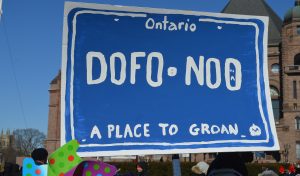Ford’s power grab: How Bill 5 and 33 threaten Ontario’s democracy
Since his re-election, Doug Ford has continued to advance his brand of neo-liberal politics in Ontario, even as he publicly criticizes the tactics of the U.S. President Donald Trump. On April 17, 2025, Minister of Energy and Mines Stephen Lecce introduced Bill 5, the Protecting Ontario by Unleashing Our Economy Act, a name clearly designed to mislead the public.
Bill 5 is an omnibus bill, meaning it bundles numerous, often unrelated, policy changes into a single piece of legislation. This is a well-established Ford government strategy: bury sweeping changes in a massive bill to reduce public scrutiny and limit debate. While Ford claims to be distancing himself from Trump, the undemocratic nature of this approach and the threats it poses to Ontario’s democracy echoes the same playbook.
Although Ford insists Trump is a danger to Ontario’s economy, his own government poses a threat to our democratic institutions, environment, and economic integrity. We don’t need to look south for threats; they are happening here at home.
For local government one of the most troubling parts of Bill 5 is Schedule 9, which would grant the provincial cabinet unprecedented powers to designate Special Economic Zones anywhere in Ontario, for any reason, without justification or transparency. These zones could operate without legislative oversight, clear processes, or accountability. Key terms such as “project” and “zone” remain undefined, giving Cabinet sweeping discretion and effectively handing unchecked executive authority to the government. This mirrors developments in the U.S., where deregulation and corporate influence dominate.
Because this bill has no requirement for public consultation, no purpose clause, and no criteria guiding provincial decision-making, the government has sweeping authority to override municipal bylaws. Under these changes, developers can build on environmentally protected lands if it is profitable, placing ecosystems at risk, weakening protections for species, and threatening critical wildlife habitats and wetlands.
The legislation also empowers the government to fast-track development projects including in sensitive regions such as the Ring of Fire without meaningful consultation or consent from affected First Nations. In the long term, this will cause lasting damage to the environment, erode safeguards for future generations, and strip away legal protections. Even basic government accountability, including obligations to consult Indigenous communities, effectively disappears.
The timing is telling. The same week Ford introduced Bill 5, Trump rolled back major protections under the U.S. Endangered Species Act. Both moves reflect a global trend toward weakening legal safeguards and giving the ultra-wealthy greater control over economic and environmental policy. Just as U.S. billionaires are promoting “freedom cities” run by CEOs, Bill 5 points Ontario toward a corporate oligarchy and away from democratic governance.
Schedule 9 is also a direct attack on the principles of democracy and the rule of law. It undermines the separation of powers by allowing ministers to override legislative authority, bypass legal processes, and handpick private companies, often politically connected “friends” to benefit from government decisions. It also removes the duty to consult marginalized and Indigenous communities, violating treaty rights and constitutional protections.
Ford is using Trump as a convenient scapegoat while quietly rushing through legislation that consolidates power. Bill 5 is not a solution to economic uncertainty, it is a calculated power grab that benefits developers and corporations at the expense of transparency, accountability, and community voices.
Just weeks later, on June 27, the last day of the school year, Education Minister Paul Calandra announced that four school boards, including the TDSB and TCDSB, would be placed under supervision,claiming the boards lacked financial responsibility and required supervisors to ensure they balanced their budgets. This move signals an alarming shift toward ending local community representation and eliminating the role of school trustees.
Earlier, introduced Bill 33, the Supporting Children and Students Act. While Bill 33 is not as extreme as Trump’s dismantling of the U.S. Department of Education, it carries the same undertones of centralized control, reduced transparency, and diminished local democracy. Ford, unlike Trump, masks his agenda behind a “folksy” persona and quiet legislative maneuvers, counting on the public not to notice until it’s too late.
The truth is that Ontario’s education crisis has been rooted in chronic underfunding since 2018. By law, school boards must submit balanced budgets by the end of June. With provincial funding failing to meet rising costs, boards have been forced to make cuts year after year. These cuts may be invisible to parents, but they are painfully clear to educators, education workers, and students, who face overcrowded classrooms, rising violence, worsening mental health challenges, and staff burnout. Publicly funded education is hanging by a thread.
Let’s be clear: the blame lies with Ford and his Conservative MPPs, not with school boards or trustees. When more than 40% of Ontario’s school boards face structural deficits, it’s not because of mismanagement. It’s because of deliberate underfunding.
Instead of restoring funding so schools can address urgent needs, Ford and Calandra are pushing Bill 33, another omnibus bill that would give the Education Minister sweeping powers to impose changes without democratic oversight. It would require school boards to allow police to take part in school programs as School Resource Officers, to ask the Minister for permission to name schools and make it easier for the government to put boards under supervision. This move alone would enable a supervisor to dispose of board property, selling it to whomever the Ministry chooses. The parallels to the Greenbelt scandal and the Ontario Science Centre closure are obvious and once again, developer interests come first.
We are at a pivotal moment. If Ford continues to pass legislation like Bills 5 and 33, Ontario will face further erosion of democratic institutions, reduced transparency, and a government that serves wealthy developers over the public good, just as we have seen in the United States. If you care about defending publicly-funded education and stopping Ford’s attacks on our democratic institutions, please visit: www.fundourschools.ca/take-action


